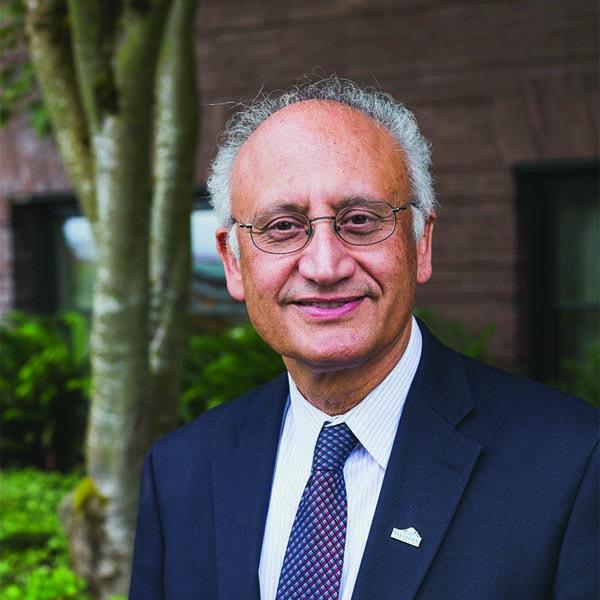The President's Report 2023
Dear Friends of Western Washington University,
As the world around us continues a roller-coaster recovery from the COVID-19 pandemic, higher education overall is facing unprecedented declines in enrollment and structural budget deficits. The National Student Clearinghouse Research Center reports that postsecondary institutions collectively have lost nearly 1.3 million students since spring 2020.
At Western, we have fared relatively better than many of our public comprehensive university peers. We welcomed about 3,200 new first-year students in fall 2023—about the same level as last year—and up about 12% from fall 2021 and almost 30% from fall 2020 levels. New students of color, first generation students, and non-residents all continue to climb from pandemic-era levels. Students of color now represent about a third of our incoming class.
We have struggled, however, with retention and graduation rates for underrepresented groups, where some of our progress has been impacted by the pandemic. For students who started between 2013 and 2018, approximately 82% returned for their second year, but for students who started in 2021, only 77% returned for a second year.
To address this challenge, we have implemented mandatory academic advising for many new first-year students to provide more proactive guidance to keep students on track.
This summer, the Academic Advising Center and Student Outreach Services were combined into one department to provide more customized learning assistance services that support students’ academic and personal success together with intentional outreach to support students with unique needs.
We were pleased to receive $1.57 million in recurring state appropriations for additional first-year math and writing instruction resources and other intensive first-year academic programs as well as funding for additional disability accommodation counselors. We are also grateful for a capital investment of $47.9 million for the creation of a new Student Development and Success Center that will bring together advising, admissions, counseling, student health services, and career development in one new modern facility purposely built to support student success. It will also serve as a welcome center for prospective students and other visitors.
We continue to make meaningful progress on expansion plans at Western on the Peninsulas. In the 2023-25 biennium, the university received $5.46 million to build programs in Bremerton, Poulsbo and Port Angeles. A bulk of that—$3.19 million—will go toward new academic programs for students who attend Olympic and Peninsula colleges for two years and transfer to Western for a bachelor's degree. Additional funding will go toward other high-demand programs, like a Master of Social Work, and student outreach and recruitment services.

We also continue to stay focused on our three strategic priorities: advancing student success, increasing impact in the state, and enhancing academic excellence. Beginning in last year’s budget development cycle, we adopted a strategic budgeting framework focused on aligning our budget with our strategic priorities. The 2023-2024 annual state operating budget, approved by the Board of Trustees in June 2023, recognizes the need to address core institutional needs impacted by the decrease in revenues due to enrollment losses during the two pandemic years and the importance of advancing our institutional priorities.
I end this note with a realistic appreciation for the road in front of us as the higher education landscape continues to change at an accelerating pace. I also hold great optimism for the coming year thanks to the foundation we have built with the support of our alumni, donors, legislators, and community friends and partners. Nothing reflects our hard work and dedication more than the success of our graduates and the positive impact they make in the state of Washington and beyond.
Sincerely,
Sabah Randhawa,
President
New WWU Leadership
Meet some of the new people in key positions at Western.
Keith Russell

Dean, College of Humanities and Social Science
Formerly chair of Western’s Health and Human Development Department, Russell is a national expert on using outdoor and adventure therapy to help people address addiction and mental health challenges.
John Danneker

Dean, Western Libraries
Danneker is the former director of the Odegaard Undergraduate Library at the University of Washington, where he also served as UW Libraries director of Learning Services.
Deanna Kennedy

Dean, College of Business and Economics
Kennedy is the former associate dean for Academics at the University of Washington Bothell School of Business. Previously, she was a professor at Texas
A & M University.
Jim Sterk

Athletics Director
Sterk, ’80, has spent 35 years in athletics administration, including stops leading athletic departments at San Diego State, Washington State and Portland State universities and the University of Missouri.
Katryne Potts

Chief of Police
A 22-year law enforcement veteran, Potts previously worked for the police department at Augusta University in Georgia and for nearly 20 years in Elgin, Illinois.
The interim deans of three colleges received permanent appointments:
Christopher Bianco

Dean, College of Fine and Performing Arts
Bianco is a music professor and regional president-elect in the College Band Director's National Association. He's also Western's former director of bands.
Janelle Leger

Dean, College of Science and Engineering
Previously, Leger was the director of AMSEC, the Advanced Materials Science and Engineering Center, and chair of the Department of Physics and Astronomy.
Kevin Roxas

Dean, Woodring College of Education
Roxas is Woodring’s former associate dean for Student Success, Access and Outreach and chair of the Department of Secondary Education.